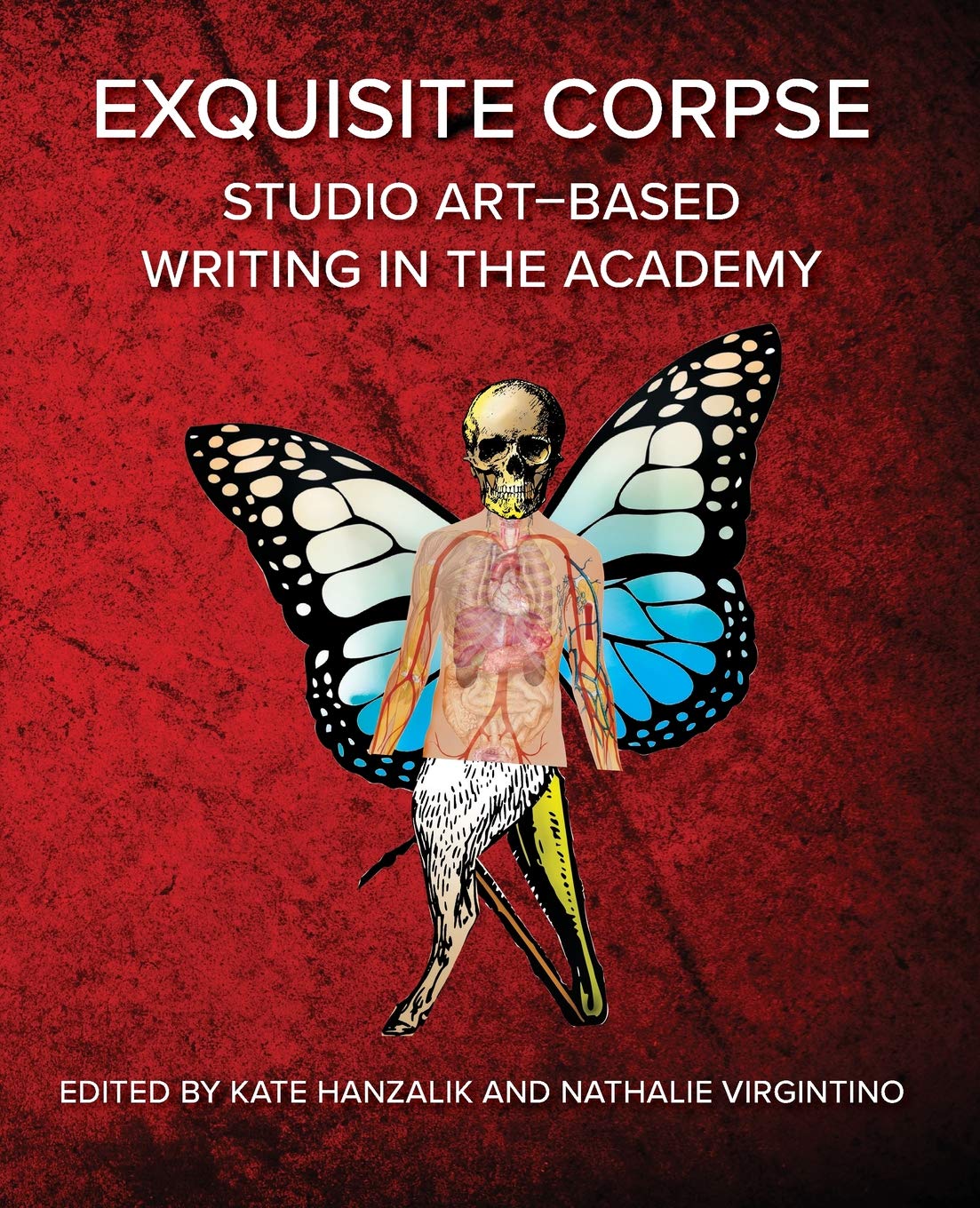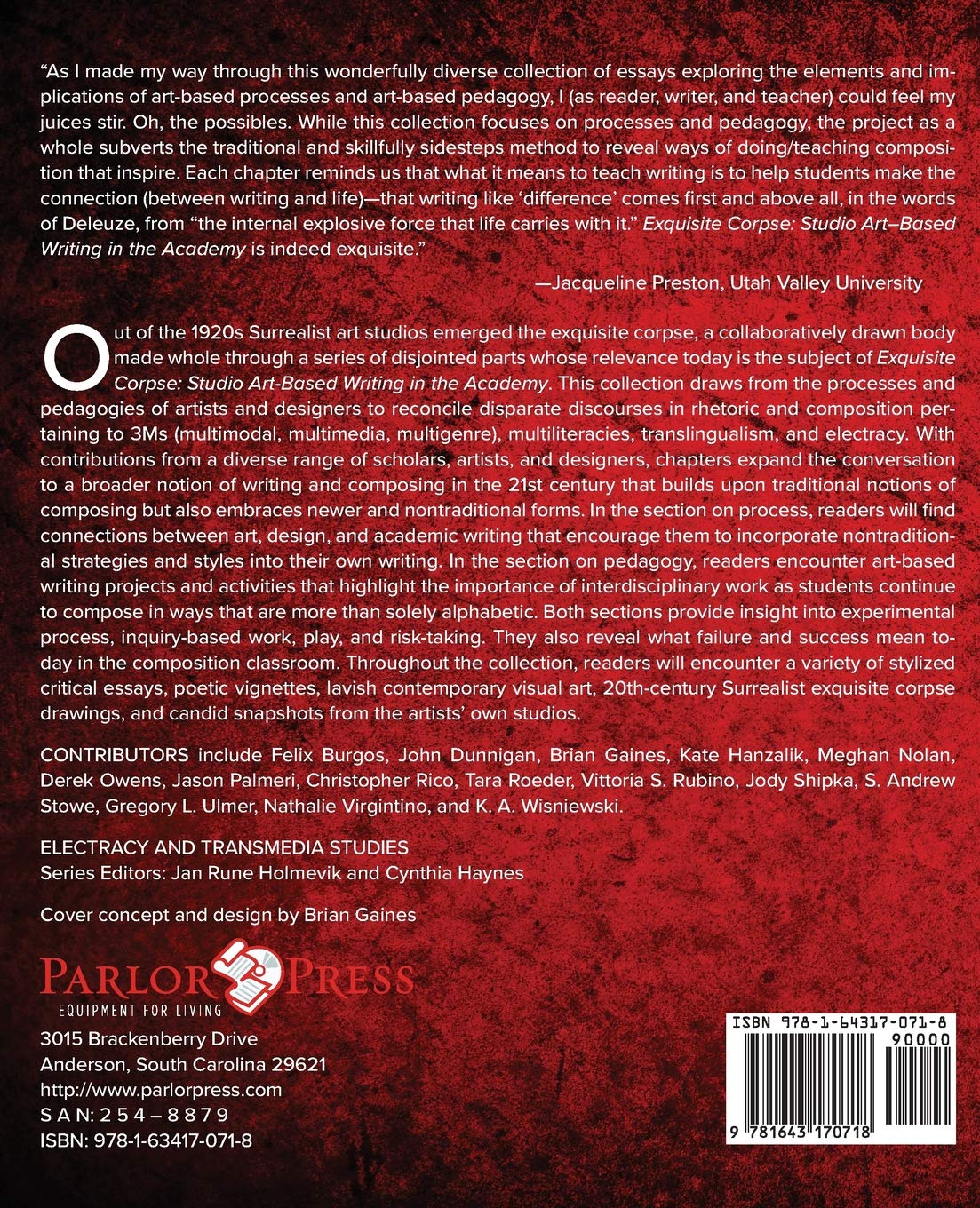Description
Edited by Kate Hanzalik and Nathalie Virgintino
Electracy and Transmedia Studies Series
Edited by Jan Rune Holmevik and Cynthia Haynes
Information and Pricing
978-1-64317-071-8 (paperback, $40) 978-1-64317-072-5 (hardcover, $80) 978-1-64317-073-2 (PDF, $19.99,) © 2019 by Parlor Press, with 42 color illustrations, bibliography, and index. 278 pages in full color, 70# white paper.
Bookstores: Order by fax, mail, or phone. See our "Sales and Ordering Page" for details.
What People Are Saying
Inspired by the Surrealist parlor game that fosters play, randomness, and collaboration in the creative process, Exquisite Corpse: Studio Art-Based Writing in the Academy breathes fresh air into traditional pedagogy in the disciplines of writing, art- making, and writing about art. Its essays advocate playfulness, fancy, collaboration, collage, improvisation, and intersecting genres to upend traditional practices of academic art-making and criticism with the goals of richer creativity, inclusivity, and social justice. Reading it has made me want to try all sorts of new things in my writing classes. —James Lough, Savannah College of Art and Design.
As I made my way through this wonderfully diverse collection of essays exploring the elements and implications of art-based processes and art-based pedagogy, I (as reader, writer, and teacher) could feel my juices stir. Oh, the possibles. While this collection focuses on processes and pedagogy, the project as a whole subverts the traditional and skillfully sidesteps method to reveal ways of doing/teaching composition that inspire. This collection, as the editors suggest, “values play, collaboration, community, imagination and artistic innovation,” resonating the Deleuzian ‘difference.’ Each chapter reminds us that what it means to teach writing is to help students make the connection (between writing and life)—that writing like ‘difference’ comes first and above all, in the words of Deleuze, from “the internal explosive force that life carries with it.” Exquisite Corpse: Studio Art–Based Writing in the Academy is indeed exquisite. —Jacqueline Preston, Utah Valley University
The nice thing about an anthology like this one is its richness. The authors draw upon theories of art-based studio pedagogy and design thinking to expand the potential of multimedia, multimodal, and multigenre for the teaching of writing. These scholars consider how visual, auditory, and tactile elements of texts can increase our understanding of the social nature of expression, perception, and empowerment. The act of creation is taken seriously by examining the affective, improvisational, and collaborative aspects of the composing process. Several authors offer active learning experiences that are open to the lives of students who are composing their own multiple, dynamic identities. —Nancy Mack, Wright State University
About This Book
Out of the 1920s Surrealist art studios emerged the exquisite corpse, a collaboratively drawn body made whole through a series of disjointed parts whose relevance today is the subject of Exquisite Corpse: Studio Art-Based Writing in the Academy. This collection draws from the processes and pedagogies of artists and designers to reconcile disparate discourses in rhetoric and composition pertaining to 3Ms (multimodal, multimedia, multigenre), multiliteracies, translingualism, and electracy. With contributions from a diverse range of scholars, artists, and designers, the chapters in this collection expand the conversation to a broader notion of writing and composing in the 21st century that builds upon traditional notions of composing but also embraces newer and nontraditional forms. In the section devoted to process, readers will find connections between art, design, and academic writing that may encourage them to incorporate nontraditional strategies and styles into their own writing. In the section devoted to pedagogy, readers will encounter art-based writing projects and activities that highlight the importance of interdisciplinary work as students continue to compose in ways that are more than solely alphabetic. Both sections provide insight into experimental process, inquiry-based work, play, and risk-taking. They also reveal what failure and success mean today in the composition classroom. Throughout the collection, readers will encounter a variety of stylized critical essays, poetic vignettes, lavish contemporary visual art, 20th-century Surrealist exquisite corpse drawings, and candid snapshots from the artists’ own studios.
Contributors include John Dunnigan, Brian Gaines, Felix Burgos, Meghan Nolan, Derek Owens, Jason Palmeri, Christopher Rico, Jody Shipka, S. Andrew Stowe, Vittoria S. Rubino, Tara Roeder, Gregory L. Ulmer, and K. A. Wisniewski.
About the Editors
Kate Hanzalik is an assistant teaching professor in the Department of Writing Studies, Rhetoric, and Composition at Syracuse University. Her work about electracy and art–based writing has appeared in journals such as Computers and Composition Online, Textshop Experiments, Itineration, and Journal of Writing in Creative Practice.
Nathalie Virgintino is an assistant professor of English at Concordia College–New York, where she serves as the writing center director. She recently completed her dissertation on the process of improvisation, and the place studio art based pedagogies in writing studies.
Contents
Introduction: Exquisite Corpse, a Meeting Ground by Kate Hanzalik and Nathalie Virgintino | Art–Based Processes: | 1 On Making by Jody Shipka | 2 Write Your Title: An Experimental Conversation Concerning Arts. Methods and Some More by S. Andrew Stowe and Christopher Rico | 3 A Place for Writing in the Studio by John Dunnigan | Interchapter: La Revolution Surrealiste | 4 Konsult Scenario: Genre for Electrate Learning by Gregory Ulmer, | 5 The Un–Publishable: Textshop Experiments and Composition(s) of/as Publishing by Felix Burgos and K. A. Wisniewski | Interchapter: Exquisite Corpse Drawing | 6 Digital Détournement: A Situationist Approach to Resisting Surveillance in the Googlized World by Brian Gaines | Interchapter: Exquisite Corpse (word/play) | Art–Based Pedagogies: | Interchapter: On Art and Composition by Tara Roeder | 7 The Artistry of Composition: Design Thinking in Writing Studies, by Vittoria Rubino | 8 Nevermind Jackson Pollock, Where’s Judy Chicago? by Jason Palmeri | Interchapter: Exquisite Corpse Drawing | 9 Social Justice in (and Beyond) the Studio Art–Based Classroom: Improvisation and Play as Responses to Economic Inequality by Kate Hanzalik and Nathalie Virgintino | 10 Workshops, Crits, and the Arts of Response by Derek Owens | 11 Multiplicity and the Student Writer: Embracing Creative Multigenre Identity Work in the Writing Classroom by Meghan Nolan | Index | Contributors | About the Editors


